
Latest News Regarding
Horn of Africa
Finland and Sweden formally apply for NATO membership
Finland and Sweden formally apply for NATO membersh

By Emily Rauhala
Source: Washington post, Wednesday May 18, 2022
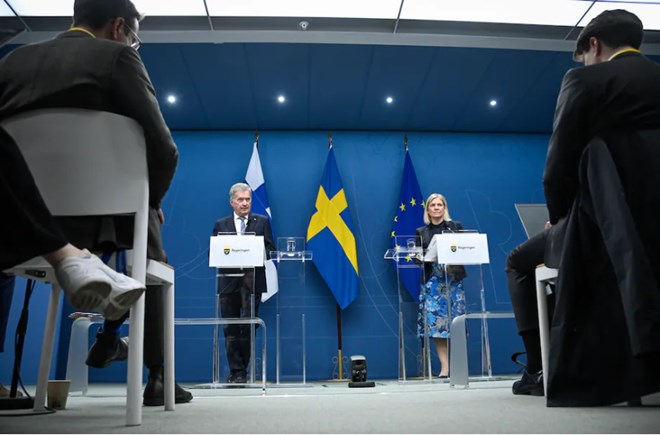
BRUSSELS — Finland and Sweden submitted letters Wednesday formally applying to join NATO, a historic moment for two countries that held fast to military nonalignment until Russia’s invasion of Ukraine upended their thinking about security.
The delivery of the letters to the alliance’s Brussels headquarters marks the start of an accession process that could take months but is expected to result in an expansion of NATO from 30 to 32 members, remaking Europe’s post-Cold War security architecture.advertisements
“I warmly welcome the requests by Finland and Sweden to join NATO,” Secretary General Jens Stoltenberg said at a news conference in Brussels with ambassadors from each country. “You are our closest partners, and your membership in NATO would increase our shared security.”
Stoltenberg called the applications a “historic step” and said allies will now consider next steps.
Swedish Prime Minister Magdalena Andersson and Finnish President Sauli Niinisto of Finland are scheduled to appear Thursday at the White House, where President Biden is expected to show his support.
NATO officials and several allies have signaled that Finland and Sweden could expect protection in the period before their membership is fully ratified and they are part of NATO’s collective defense pact, known as Article 5.
A big question is whether Russian President Vladimir Putin will retaliate. European officials and diplomats said Finland and Sweden are prepared for hybrid or clandestine attacks.
Putin cited the threat of NATO expansion among the rationales for his unprovoked invasion of Ukraine. Kyiv is not on track for NATO membership, but Putin’s war has resulted in a reinvigorated alliance that is now poised to double its land border with Russia.
The two new members would bring NATO’s full force to the far north and bolster its presence in the Baltic Sea region. The alliance would gain two sophisticated militaries with deep experience operating near Russia’s frontier. Sweden also holds the strategically important island of Gotland, just 200 miles from the Russian military in Kaliningrad.
Finland and Sweden didn’t consider themselves neutral before now. Militarily, they have been close NATO partners. Politically, they are members of the European Union.
But thinking of themselves as nonaligned militarily has been an important part of their self-conception. Before Russia’s invasion of Ukraine, a majority of people in both countries said it was safer to be outside NATO. But the past months have seen a dramatic swing in public opinion.
“We are leaving one era and beginning another,” Sweden’s Andersson said Monday, announcing the decision.
“This is an extraordinary development given where we were in February,” said Anna Wieslander, director for Northern Europe at the Atlantic Council think tank.
“Russia wanted to turn back time, to go back to the Cold War, to fragment and weaken the West,” she continued. “Now, in May, we are here.”
After receiving the applications, NATO will convene its decision-making body, the North Atlantic Council, to decide whether to move forward with the request. Then there will be accession talks, said a NATO official who spoke on the condition of anonymity according to the alliance’s ground rules.
This first phase of the accession process is expected to be swift, largely because both countries are already close NATO partners. From there, it could take “months” for each member state to ratify the decision, the official said.
Turkish President Recep Tayyip Erdogan voiced skepticism last week about Sweden and Finland’s accession, but NATO officials and analysts say Turkey will fall in line. “We are determined to work through all issues and reach rapid conclusions,” Stoltenberg said Wednesday.
Russian officials have warned of “consequences” at every step but have offered more muted rhetoric in recent days.
Putin said Monday that Finland and Sweden’s entry into NATO did not represent an imminent danger to Russia, but he warned that a military buildup in either country could change that assessment.
“Russia has no problems with Finland and Sweden, and in this sense, expansion at the expense of these countries does not create an immediate threat for us,” he said in televised remarks on Monday. “But the expansion of military infrastructure into this territory will certainly provoke our response.”
“What it will be, we will look at based on the threats that will be created for us,” he continued. “We will respond accordingly.”
In a weekend telephone call, Putin told Finland’s Niinisto that the decision to join NATO was “wrong” and could have “a negative effect” on Russian-Finnish ties, but he did not make specific threats, according to accounts of the call.
NATO and European officials have for the most part downplayed the risk of significant Russian aggression.
The country’s military remains tied up in heavy fighting in Ukraine and has lost soldiers and equipment. Russia also withdrew troops from the border with Finland to fight in Ukraine, leaving Moscow with a reduced capacity to target the border militarily.
Given widespread support for the Nordic countries’ NATO accession, it will be difficult for Russia to influence their populations.
“There is no place to intervene, there is no ground to make people change their minds,” said Henri Vanhanen, a foreign policy expert and adviser to the center-right National Coalition Party in Finland. “This is the democratic resilience we have against Russia.”
“It is out of Russia’s reach right now to try to stop Finland and Sweden from joining NATO,” he said. “It has to come to terms with it.”
If Putin does try anything, allies have pledged support. Britain, Denmark, France, Iceland and Norway are among countries that have promised military support should either Finland or Sweden come under attack. “Whoever would seek to test European solidarity by threatening or attacking their sovereignty, through whatever means, must be certain that France will stand shoulder to shoulder with Finland and Sweden,” according to a French statement released Monday.
Ethiopia, Kenya, Djibouti congratulate the new president of Somalia 18 Shares

Source: Hiiraan online, Monday May 16, 2022
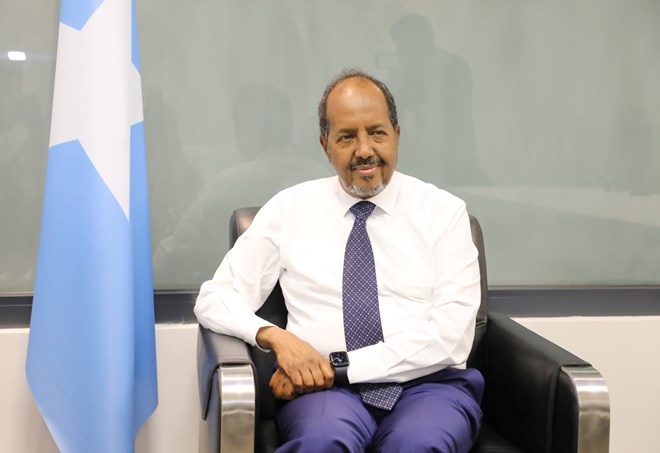
Mogadishu (HOL) – Leaders of Ethiopia, Djibouti, and Kenya on Monday congratulated Hassan Sheikh Mohamud on his re-election as President of the Federal Republic of Somalia as the neighboring countries vie for new relations with the new government.
Kenyan President Uhuru Kenyatta wished the new Somalia Head of State good health and success as he took over the reins of leadership and assured him of Kenya’s continued cooperation and comradeship.
Ethiopia’s Prime Minister Abiy Ahmed Ali acknowledged that he looks forward to working closely with the new president on common bilateral and regional interests.
President of Djibouti, Ismail Omar Guelleh, described the new president’s election as a testament to Somali institutions’ resilience and a historic moment for all Somalis.
Hassan Sheikh Mohamud, who served as Somalia’s president between 2012 and 2017, won the election with 214 votes, while the outgoing president Mohamed Abdullahi Farmaajo received 110 votes in the final round of the voting last Sunday.
Djibouti, Ethiopia, and Kenya are among the five African Union Transition Mission in Somalia (ATMIS) troop-contributing countries, alongside Burundi and Uganda.
Somalia elects Hassan Sheikh Mohamud as new president
Somalia elects Hassan Sheikh Mohamud as new president

Source: Aljazeera, Monday May 16, 2022
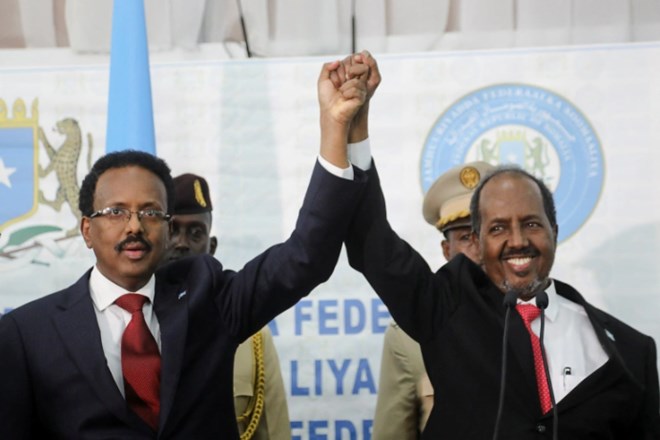
Somali legislators have elected former leader Hassan Sheikh Mohamud as the country’s next president, following a long-overdue election on Sunday in the troubled Horn of Africa nation.
Hassan Sheikh Mohamud, who served as Somalia’s president between 2012 and 2017, won the contest in the capital, Mogadishu, amid a security lockdown imposed by authorities to prevent deadly rebel attacks.advertisements
After a marathon poll, involving 36 candidates, that was broadcast live on state TV, parliamentary officials counted more than 165 votes in favour of former President Mohamud, more than the number required to defeat incumbent President Mohamed Abdullahi Mohamed.
Supporters of Somalia’s new leader defied the curfew to pour onto the streets of Mogadishu, cheering and firing guns as it became clear that Mohamud had won the vote.
Many hope the vote will draw a line under a political crisis that has lasted well over a year, after Mohamed’s term ended in February 2021 without an election.
The president – who is also known as Farmaajo because of his appetite for Italian cheese – conceded defeat, and Mohamud was immediately sworn in.
The new leader struck a conciliatory tone in his acceptance speech from the airport compound in Mogadishu, which was patrolled by African Union (AU) peacekeepers.
“It is indeed commendable that the president is here standing by my side,” Mohamud said, referring to the former leader, who had sat with him as ballots were counted.
“We have to move ahead, we do not need grudges. No avenging,” the new president said.
War, drought
The 66-year-old Mohamud is the leader of the Union for Peace and Development party, which commands a majority of seats in both legislative chambers.
A member of the Hawiye clan, one of Somalia’s largest, Mohamud is regarded by some as a statesman with a conciliatory approach. He is also well-known for his work as a civic leader and education promoter, including for his role as one of the founders of Mogadishu’s SIMAD University.
Mohamud had promised during campaigning that his government would be inclusive, acknowledging the mistakes of his previous government, which faced multiple corruption allegations and was seen as aloof to the concerns of rival groups.
He now inherits several challenges from his predecessor, including the increasing number of attacks from the al-Qaeda-linked al-Shabab group and a devastating drought that threatens to drive millions into famine.
Two suicide bombings in March killed 48 people in central Somalia, while an attack on an AU base earlier this month killed 10 Burundian peacekeepers. The attack was the deadliest raid on AU forces in the country since 2015.
The United Nations has meanwhile warned of a humanitarian catastrophe unless early action is taken, with emergency workers fearing a repeat of the devastating 2011 famine, which killed 260,000 people – half of them children below the age of six.
Mohamud will also need to repair the damage caused by months of political chaos and infighting, both at the executive level and between the central government and state authorities.
“It’s really been a lost year for Somalia,” said Omar Mahmood, an analyst at the International Crisis Group (ICG) think-tank.
“This long-awaited election has been divisive. Reconciliation is the most immediate challenge,” Mahmood told the AFP news agency.
Though just holding Sunday’s election was a success of sorts, many Somalis were sceptical of any real improvement.
Most of the 36 candidates were old faces recycled from the past who had done little to stem war and corruption, they complained. Votes are anyway influenced more by money changing hands than political platforms, Somalis and analysts say.
“Hassan Sheikh is not good but he is the lesser of the two evils. We hope Somalia will be better,” said Halima Nur, a mother of four in Mogadishu.
“We hope this time Hassan Sheikh Mohamud will improve and become a better leader. We hope Somalia will be peaceful, though this may take time,” said student Mohamed Ismail.
Somalia has not held a one-person, one-vote election in 50 years. Instead, polls follow a complex indirect model, whereby state legislatures and clan delegates pick lawmakers for the national parliament, who in turn choose the president. The third round of voting was decided by 328 legislators, and a simple majority was enough to choose a winner.
Analysts had predicted that incumbent President Mohamed would face an uphill battle to be elected amid widespread criticism from Somalis and foreign donors for trying to extend his tenure last year.
Somalia’s international partners had repeatedly warned that the election delays – caused by political infighting – were a dangerous distraction from the fight against al-Shabab fighters who have been trying to overthrow the government for more than a decade.
Mohamed, who rose to power in 2017 as a symbol of a Somali diaspora eager to see the country prosper after years of turmoil, leaves behind a country even more volatile than before he took over, and with rising al-Shabab attacks.
In his concession speech, Mohamed said his successor faced a “huge task” and pledged solidarity with him.
“Let us pray for the new president, it is a very tedious task,” he said. “We will be in solidarity with him.”
Somalia has endured conflict and clan battles with no strong central government since the fall of Mohamed Siad Barre in 1991. The government has little control beyond the capital and the AU contingent guards an Iraq-style “Green Zone”.
Q&A: An ambitious attempt to be Somalia’s first female president
Q&A: An ambitious attempt to be Somalia’s first female president

Source: Aljazeera, , Saturday May 14, 2022
There are a few exceptions but Somali women hardly get into politics or hold top public office in what remains a deeply conservative society. Fowzia Yusuf, one of those, speaks to Al Jazeera on seeking another first.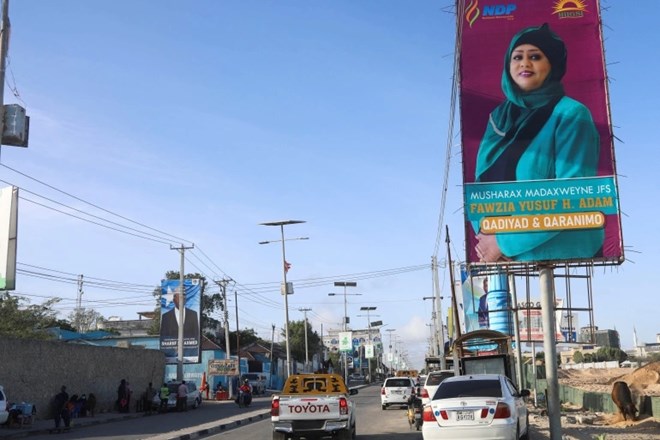
An election banner for Somali presidential candidate and former Foreign Minister Fowzia Yusuf Adam is seen in Mogadishu, Somalia May 12, 2022 [File: Feisal Omar/Reuters]
This Sunday, Somalia is expected to hold its highly anticipated and long-delayed presidential election as 39 presidential candidates jostle for the country’s top position.
Some of the contenders include the incumbent, two former presidents, the immediate former prime minister and the president of the regional state of Puntland, joined the race.
Also in the race is Somalia’s only female presidential candidate, Fowzia Yusuf Adam. She is a legislator and a well-known women’s rights advocate who made history as the country’s first female deputy prime minister and female foreign affairs minister.
The exercise was scheduled to happen more than a year ago but could not, due to a protracted political crisis and raging insecurity being spearheaded by al-Qaeda-linked armed group, al-Shabab.
It is now happening against the backdrop of a May 17 deadline by donors like the International Monetary Fund for the Horn of Africa nation to put in place a government or lose funding.
But no votes will be cast by the Somali people. In the country’s unique electoral system, each clan respectively elects their members of parliament and thus makes the country hold its indirect presidential election.
In all, parliament has 329 members, with 54 of those in the Senate. The Senate members represent the five regional states and are elected by provincial legislators while the other lawmakers are elected by delegates appointed by clan elders and members of civil society. They jointly elect the president who leads the country for four years.
There are a few exceptions but Somali women hardly get into politics or hold top public office, given cultural restrictions in what remains a deeply conservative society.
But Fawzia, the country’s first-ever female deputy prime minister and foreign affairs minister between November 2012 to January 2017, wants to prove that wrong. She is competing with 38 men.
Al Jazeera spoke to Fowzia Yusuf.
Al Jazeera: What encouraged you to join the Somalia presidential race?
Yusuf: The reason is that, since I was deputy prime minister, acting prime minister and even foreign [affairs] minister, I thought I could do more If I went for the top job. I realised that I couldn’t make any tangible achievement unless I aim for the top job.
I was also encouraged by the endless war in Somalia and the lack of good public services to the people.
I also realised the hardship Somali women, children and refugees face. I am so motivated that other countries have progressed well, and we are still struggling with war, yet we have enough natural resources to prosper.
Al Jazeera: What are your plans for your presidency?
Yusuf: If allowed to lead Somalia, I will strengthen the rule of law, complete the draft constitution and strictly follow it. I will implement true reconciliation across the country. Rebuilding the Somali national army and timely providing their rights and need for peace and security is the key to stability.
My utmost priority is to revive the country’s economy by developing the Infrastructural and industrial sector since Somalia has Africa’s longest coast sea. My country has economic resources, including agriculture, fishing and livestock. I will modernise them to fight poverty and create employment for the public so that they can pay taxes.
Abandoning the clan-based system for a proper democratic process is also my ambition.
Regarding public services, I will provide free healthcare and education to the public across the country. Above all, the fight against corruption and prioritising women’s and children’s needs will be the hearts of everything in my administration.
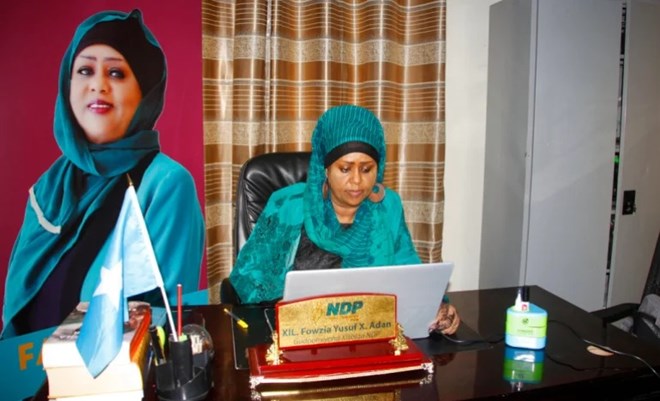
Somali lawmaker and presidential candidate Fowzia Yusuf H Adam sits in her office in Mogadishu, Somalia Saturday, July 17, 2021 [Farah Abdi Warsameh/AP Photo]
Al Jazeera: What do you think has gone wrong with Somalia?
Yusuf: Usually, civil war happens in many parts of the world, but the main problem in Somalia is that there was no true reconciliation in the country after the civil war, and that gave the terrorist organisation a chance to do what they wanted. The absence of an actual democratic process has significantly contributed to the instability in Somalia.
Al Jazeera: Currently, drought and climate change issues are affecting Somalia. How do you plan to resolve this?
Yusuf: My understanding is that deforestation is the main reason for Somalia’s drought and climate change. I will develop a strict policy to address environmental destruction if given a chance. Cloud seeding is a modern way of addressing the drought and is one of my strategies in places. I will modernise the agricultural and livestock sector to provide enough food for the people.
Al Jazeera: What about addressing the matter of insecurity, which has been the primary challenge in Somalia?
Yusuf: I believe we can try to negotiate with al-Shabab and understand what they want. Resolving FARC rebels in Colombia and the war in Afghanistan through negotiation has worked.
Al Jazeera: You are contesting as the only woman in the race; what makes you different from other candidates? Do you think you will make it given the number of men in the race and the societal resistance to having women lead?
Yusuf: Yes, I will make it, and Somali women have potential if given a chance. I believe Somalia will be a peaceful and stable country under women’s leadership.
I am different because I dared to do it. I am the leader of a political organisation and realise that nobody can stop the women if they are willing to do [anything]. I want to be a role model for Somali women.
Al Jazeera: What are the challenges Somali women face in getting into leadership?
Yusuf: The challenges are many; cultural challenges surround the women. Women are the leaders in many countries worldwide, including Tanzania; therefore, cultural and religious discrimination against women only happens in Somalia.
For this country to prosper, we must get women in leadership.
WHO Regional Director for the Eastern Mediterranean officially launches WHO emergency health response plan for drought in Somalia
WHO Regional Director for the Eastern Mediterranean officially launches WHO emergency health response plan for drought in Somalia

Source: WHO, Thursday May 12, 2022
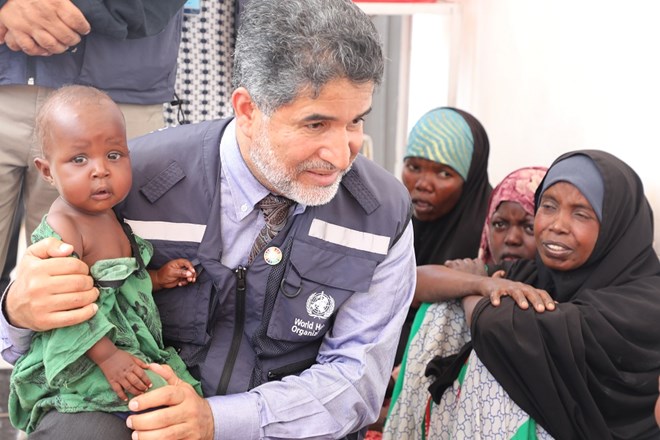
During his 3-day visit to Somalia, the World Health Organization (WHO) Regional Director for the Eastern Mediterranean Dr Ahmed Al-Mandhari visited North Galkacyo in Puntland state of Somalia to oversee WHO’s ongoing drought response activities, see the work of community health workers in delivering integrated health and nutrition services to the people displaced by the recent drought in Somalia and also visit one of the internally displaced population’s camps to see the challenges faced by the communities in meeting their health, nutrition, food and water and sanitation needs.
Laster on, he attended an event in Mogadishu where the WHO emergency health response plan for drought was officially launched which was also attended by HE Dr Fawziya Abikar Nur, the Minister of Health and Human Services of Federal Government of Somalia, Mr Jocelyn Mason, the United Nations Resident Coordinator for Somalia, ad interim and Mr Mugatte Guisse, the United Nations Humanitarian Coordinator for Somalia, ad interim.advertisements
The ongoing drought in Somalia and across the Horn of Africa is known to be the region’s worst one in the last 4 decades. In Somalia alone, an estimated 6.1 million people have been affected by the drought, of whom 759 400 have been displaced in search of water, food and pasture; 3.5 million lack sufficient access to water; 6 million continue to face severe food shortages, with approximately 1.4 million children facing acute malnutrition through 2022, including 329 500 likely to become severely malnourished; So far, a total of 3675 suspected cases of cholera and 2720 cases of measles have been confirmed since January 2022 from the drought-affected areas.
“Whenever natural disasters strike, diseases inevitably follow, particularly in fragile contexts. At all levels, WHO is leaving no stone unturned to support the people of Somalia to cope with the austere effects of drought,” said Dr Al-Mandhari. “As one of the first responders on the ground, WHO is working with the government, donors, and other UN agencies and health cluster partners to reduce the spread of diseases and complications related to malnutrition, while simultaneously rebuilding health systems to cope with similar calamities in the future.”
The WHO’s emergency health response plan for drought in Somalia for 2022, urgently requires US $35 million over the next 10 months to deliver emergency life-saving operations to reach over 2.5 million vulnerable people in the worst-affected parts of the country.
Dr Al-Mandhari explained that the drought response plan, which will serve as WHO’s blueprint for intensifying efforts to save more lives and cushion Somalis from severe forms of disease and malnutrition, was based on lessons learnt from past droughts in Somalia and would help to prevent epidemics, save lives, protect communities’ health and nutrition needs, and avert an additional health crisis. He also praised the Federal Government and UN partners for their collaborative efforts, emphasizing that the true essence of the Eastern Mediterranean Region’s Vision 2023 of “health for all by all” was in solidarity with the ongoing drought response work.
“WHO is responding to Somali families’ most dire needs, and is working to ensure every Somali household, including the most vulnerable, can access emergency life-saving support especially during emergencies. The WHO Emergency Health Response Plan for drought in Somalia calls for early action on a no-regret basis. It is imperative that WHO has access to flexible, smart and unearmarked funds to scale up our life-saving operations in the hard-to-reach areas to protect health and well-being of the people impacted by the drought” said Dr Mamunur Malik, WHO Representative to Somalia.
Somalia set to elect new president amid growing insecurity
Somalia set to elect new president amid growing insecurity

Source: AP, Thursday May 12, 2022
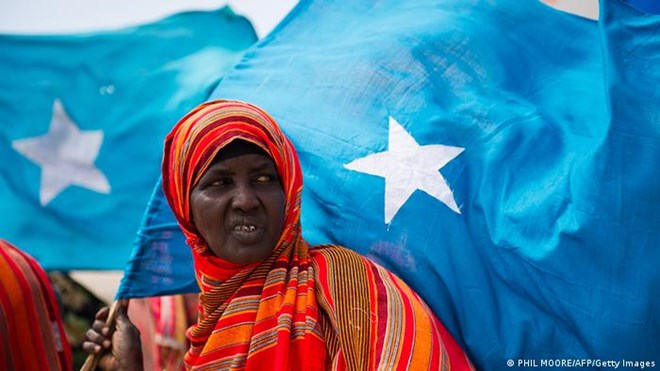
Somalia is set to hold its long-delayed presidential vote on Sunday, ending the convoluted electoral process that raised tensions in the country when the president’s term expired last year without a successor in place.
Authorities have registered 39 presidential candidates, a list that includes incumbent Mohamed Abdullahi Mohamed, two former presidents, a former prime minister, several top officials and even a journalist. The field includes one woman, Fawzia Yusuf Haji Adam, a lawmaker who once served as Somalia’s foreign minister.advertisements
The vote will take place amid heightened insecurity as the Islamic extremist group al-Shabab, which opposes the federal government, continues to stage lethal attacks in the capital and elsewhere in the Horn of Africa nation.
With mortar shells and gun assaults, al-Shabab in recent months has repeatedly tested the defenses of the Halane military camp, which is protected by African Union peacekeepers. A suicide bombing Wednesday killed at least four, including two government soldiers, at a checkpoint near the heavily fortified airport area where lawmakers will meet Sunday to choose a new president.
The vote is behind schedule by 15 months and Somali authorities faced a May 17 deadline to hold the vote or risk losing key funding from international donors.
Somali polls are unpredictable, and it appears Mohamed — who is also known as Farmaajo — faces a tough battle for reelection. Mohamed has been locked in a power struggle with his prime minister, Mohamed Hussein Roble, over control of the government. Roble is not running for president, but behind the scenes he and other former leaders could play a decisive role in the outcome of the vote.
“A lot of issues are at stake. The most important thing is to oust the incumbent and unite all candidates against him, although he is aware his chances for re-election are minimal, unlike his predecessors,” said Mohamed Mohamud, a Mogadishu-based political analyst.
“There are disturbing phenomena that the incumbent can’t secure the required votes for his re-election, but he is determined to twist results for his preferred opposition candidate and attempt to prevent specific candidates from winning even if they are ahead in the polls,” he said.
Despite its persistent insecurity, Somalia has had peaceful changes of leadership every four years since 2000, and it has the distinction of having Africa’s first democratically elected president to peacefully step down, Aden Abdulle Osman in 1967.
Somalia began to fall apart in 1991, when warlords ousted dictator Siad Barre and then turned on each other. Years of conflict and al-Shabab attacks, along with famine, have shattered the country of some 12 million people.
The goal of a direct, one-person-one-vote election in Somalia remains elusive. It was meant to take place this time. Instead, the federal government and states agreed on another “indirect election,” with lawmakers elected by community leaders — delegates of powerful clans — in each member state.
All 329 lawmakers of both chambers of parliament are expected to vote by secret ballot on Sunday. To win in the first round, a candidate must secure two-thirds of the vote, or 219 ballots. Observers expect a second or even third round of voting for the four top candidates.
In addition to Mohamed, major contenders include former presidents Hassan Sheikh Mohamud and Sharif Sheikh Ahmed, as well as Said Dani, the current president of the regional state of Puntland.
Somali elections are notoriously corrupt, and there have been widespread allegations of bribery beginning with the selection of lawmakers.
Mohamed’s four-year term expired in February 2021, but he stayed in office after the lower house of parliament approved a two-year extension of his mandate and that of the federal government, drawing fury from Senate leaders and criticism from the international community.
The poll delay triggered an exchange of gunfire in April 2021 between soldiers loyal to the government and others angry over what they saw as the president’s unlawful extension of his mandate.
Under pressure, Mohamed reversed the term extension and instructed the prime minister to engage with leaders of regional states to chart a fresh roadmap to the vote.
Whoever wins the election faces the urgent issue of insecurity, with al-Shabab fighters making territorial gains in recent months. The new president will also have to help ease tensions between regional states competing for limited resources, analysts say.
“We are hoping that the next president will be someone who can put the nation’s interest before his interest and lead the country towards peace and prosperity,” said Farhan Isak Yusuf, deputy executive director of Somali Public Agenda, a Mogadishu-based policy think tank and research group. “The decision is in the hands of lawmakers who are entirely independent and not loyal to any certain groups (but) frequently manipulated by money.”
USAID announces $6.8 million to boost rural education in Somalia
USAID announces $6.8 million to boost rural education in Somalia
Source: USAID
Monday May 9, 2022
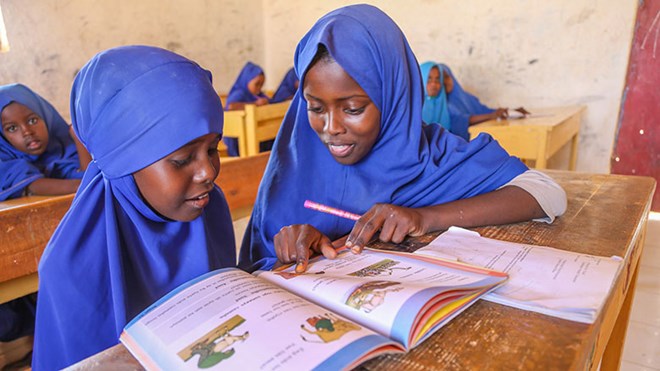
The U.S. Embassy, through the U.S. Agency for International Development (USAID), is proud to announce the Stabilization through Education Program (STEP) to increase access to education in communities affected by conflict. STEP is a $6.8 million initiative that will be implemented through the International Organization for Migration (IOM). Over the next 18 months, IOM will work with communities to rehabilitate more than 200 damaged classrooms and related school infrastructure, including boundary walls, latrines, and water systems. These efforts will support Somalia’s newly established Education Sector Strategic Plan (ESSP) for 2022-2026.
This latest announcement brings USAID’s ongoing investments in education in Somalia to nearly $71 million. USAID also supports the Bar ama Baro (“Teach or Learn”) accelerated basic education program and contributes to the United Kingdom’s Foreign, Commonwealth, and Development Office’s Adolescent Girls Education in Somalia Program. USAID’s education initiatives will reach more than 160,000 children over the next three years.
U.S. Ambassador to Somalia Larry E. André, Jr.,said, “Investment in education is essential for Somalia’s revival. Education is a powerful driver of economic development and one of the strongest instruments to reduce poverty and improve health outcomes, gender equality, and long-term stability.”
STEP will target communities with limited access to education in hardtoreach and remote areas, bring communities together to develop community-based education plans, and rehabilitate or construct classrooms and school infrastructure.
Minister of Education, Culture, and Higher Education Abdullahi AbukarHaji stated,”As Somalia embarks on the journey of state building and reviving its institutions, the Ministry of Education, Culture, and Higher Education is at the heart of promoting peace and prosperity. The ESSP reflects the priorities of the Somali government, which seeks to deliver educational services throughout the country.”
IOM Somalia Chief of Mission Frantz Celestin added, “After several years working closely with local authorities to enhance stability, it is with great enthusiasm that IOM is supporting the Ministry of Education and USAID’s Bar ama Baro program to broaden access to primary education. This collaboration is made possible by communities and authorities working together in confidence to build a brighter future for the next generation. IOM is honored to be part of this effort.”
In alignment with the ESSP, the United States will continue to work with the Ministry of Education, Culture, and Higher Education and Federal Member States’ Ministries of Education to provide educational opportunities to outofschool children; those who are marginalized; and populations displaced by drought, conflict, and insecurity to build a strong, equitable education system.
olving Somalia’s Security Crisis
Solving Somalia’s Security Crisis
Source: Newsweek published on 5 May 2022 a commentary titled “Biden Needs to Look Beyond the Military to Solve Somalia’s Security Crisis” by Marcel Plichta, University of St. Andrews.
Returning several hundred soldiers to Somalia removed by the Trump administration will not win the war against al-Shabaab and solve the country’s governance problems. The Biden administration needs to prioritize non-military policies to address Somalia’s security crisis.
Labels: AFRICOM, al-Shabaab, Biden administration, governance, security, SNA, Somalia, Trump administration, US
AfDB briefs Donors on its new strategy for Somalia
AfDB briefs Donors on its new strategy for SomaliaFacebookFacebook messenger

Sunday May 8, 2022
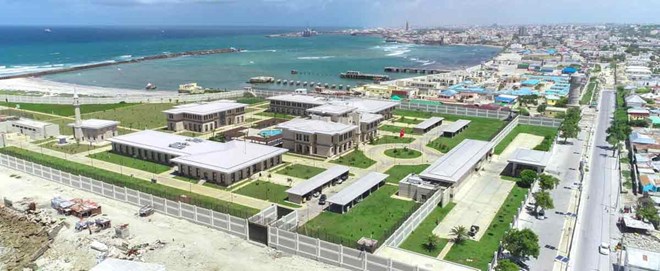
The AfDB briefed donors on its new Country Brief for Somalia and the status of the Multi-Partner Somalia Infrastructure Fund (SIF). The briefing was chaired by Gabriel Negatu, Director General of the Bank’s Eastern Africa Regional Centre. Representatives from the Italian Agency for Development Cooperation, UK DfID, USAID, High Commission for India, Delegation of the European Union to Somalia, and the French, Danish and Finnish Embassies participated in the meeting.
The new Country Brief builds on the Bank’s work in Somalia over the past few years and will be aligned to Somalia’s National Development Plan 2017-2019(link is external) by directly supporting the Plan’s goals of developing effective and efficient institutions, restoring strategic infrastructure, and building resilience. The pillars of the CB will position the Bank to tangibly deliver on its High 5s agenda in Somalia. The indicative project pipeline of US$ 110 million has been selected from the SIF project pipeline, which was approved by the Somali Development and Reconstruction Facility (SDRF)(link is external) in November 2016.
The Bank noted that since the establishment of the SIF in October 2016, the Fund has made good progress. Its first two projects – “Improving Access to Water and Sanitation Services in Somalia” and “Strengthening Institutions for Public Works” – were approved in December 2016 and are proceeding well, with disbursement rates for both projects at about 20%.
Key activities include finalising assessments for selected boreholes and mini-water system sites in different regions, with technical designs and bills of quantities prepared and submitted to the Ministry of Energy and Water Resources for approval. Training of Engineers in the Ministry of Public Works, Reconstruction and Housing on structural inspection of buildings has also been undertaken.
Donors present at the meeting provided brief updates on their ongoing and planned infrastructure operations in Somalia. The need to strengthen information sharing among all stakeholders was reiterated.
Finally, it was generally observed that rehabilitating and developing Somalia’s infrastructure is an ambitious agenda, but one that is attainable with the strong support of donors and other stakeholders.
Horn of Africa ravaged by worst drought in four decades
Horn of Africa ravaged by worst drought in four decades
Tuesday May 3, 2022
Source: By Andres Schipani in Gode and David Pilling in Nairobi
Up to 20mn people could go hungry as delayed rains exacerbate fallout from war in Ukraine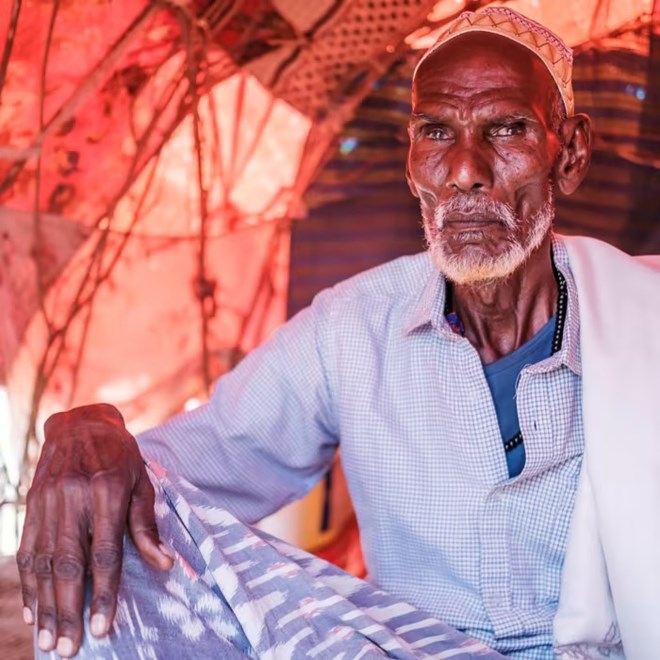
Abdullahi Abdi Wali, 99 years old, at this tent at the Higlo camp for Internally Displaced People near the village of Higlo, Ethiopia, on April 27 2022 © Eduardo Soteras Jalil/FT
When the last of his 250 goats died, pastoralist Abdullahi Abdi Wali knew it was time to flee what he calls the “worst drought” in his 99 years of life.
“This is the first time I was displaced by a drought,” he said, looking back on his near-century in south-eastern Ethiopia.
After the death of his animals, Wali walked for five days under a scorching sun to reach a makeshift camp hosting 10,000 Ethiopian pastoralists outside the city of Gode, where they now receive food and water.
In the Horn of Africa as a whole, in an area stretching from northern Kenya to Somalia and swaths of Ethiopia, up to 20mn people could go hungry this year as delayed rains exacerbate what was already the worst drought in four decades.
advertisements
After three consecutive rainy seasons failed and a fourth looks likely to do the same, crops have disappeared and more than a million livestock have died in Ethiopia’s south-eastern Somali region alone.
One more dry season could turn what is already a disaster into the worst drought in a century, locals say — just as the region is braced for what could be the devastating fallout of war in Ukraine. The conflict threatens not only to increase food prices but also to push the cost of fertiliser beyond the means of millions of farmers, threatening next year’s harvest.
“Globally, we are facing a year of unprecedented needs as conflict, climate shocks and the rising costs of food and fuel leave millions in need of humanitarian assistance,” said Michael Dunford, World Food Programme regional director for eastern Africa.
As temperatures rise globally, food security in the arid and semi-arid parts of the Horn are becoming evermore precarious, experts say. Although droughts are not new, they are becoming more frequent and severe. Since 2008, the area has registered a drought almost every year. In 2011, a famine in Somalia is thought to have killed a quarter of a million people.
Temperatures in parts of the Horn of Africa have scaled record highs. Over the past four decades, rainfall averages have continued to decline, with shorter and shorter rainy seasons.
Now the situation is so severe that local elders in villages in Ethiopia’s Somali region recount stories of half-starved hyenas, monkeys and warthogs attacking under nourished children for food. “We had to move the children to the city to protect them,” said Mohamed Dagane Digabe, a clan elder in the village of Gabia, almost 30km from Gode.
But for many, there may be nowhere to run.
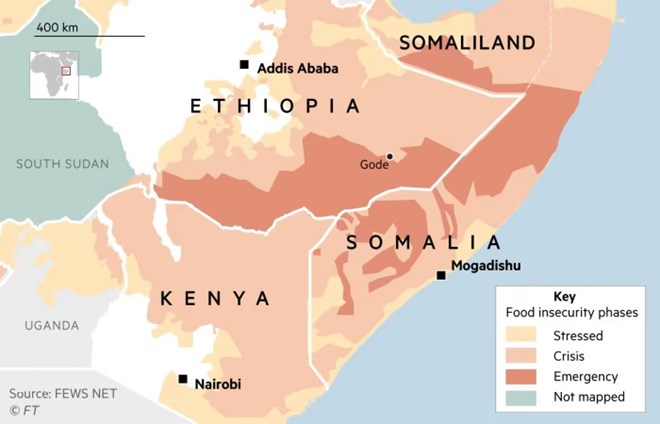
“It is regional so options for migrating to neighbouring areas are not there,” Mustafa Mohamed Omar, president of Ethiopia’s Somali region, told the Financial Times. “Somalia is affected, Kenya is affected, parts of Oromia in Ethiopia are affected. We are sure such a drought is unseen in almost 50 years; people are even saying 100 years.”
The WFP is warning of outright famine in Somalia, where some 6mn people, or 40 per cent of the population, are facing acute food insecurity in a country where jihadi violence is rife. Some analysts say more people are fleeing hunger in the country than violence.
In Ethiopia, which is reeling from a brutal civil war in the northernmost region of Tigray — a conflict that had already left some 9mn people food insecure there and in nearby regions Amhara and Afar — an additional 7mn people now wake up hungry every day in the south and south-east regions, mainly Somali, according to the WFP.
Even in relatively prosperous and stable Kenya, the number of people in need of assistance has risen more than fourfold in less than two years, with drought leaving over 3mn acutely food insecure. “The unpredictable rain for semi-nomadic pastoralism, which supports most people in northern Kenya, makes this increasingly unsustainable.” warned Murithi Mutiga, Africa programme director at Crisis Group in Nairobi. “This will be a huge contributor to instability.”
At a ward dedicated to malnourished children at the general hospital in Gode, where doctors are tending to 2-year-olds who weigh half what they should, Mohamed Abdi Kassa, the medical director, said: “We are expecting more malnourished patients because the drought is not stopping.”
Dunford said: “There is absolutely a crisis unfolding before our eyes across drought-affected parts of the Horn of Africa. In Somalia there is a very real risk that we may see a famine in the coming months if we don’t have rains.” Without adequate funding, he added, humanitarian agencies would not be able to respond if the crisis spread. “People are going to die. It’s as simple as that.”
Over the next six months, the WFP alone estimates it needs more than $470mn to scale up assistance across the three countries. But after the economic cost of Covid, donors — distracted by the war in Ukraine – were unlikely to stump up sufficient funds, experts said. “Nobody’s got any money,” said one diplomat.
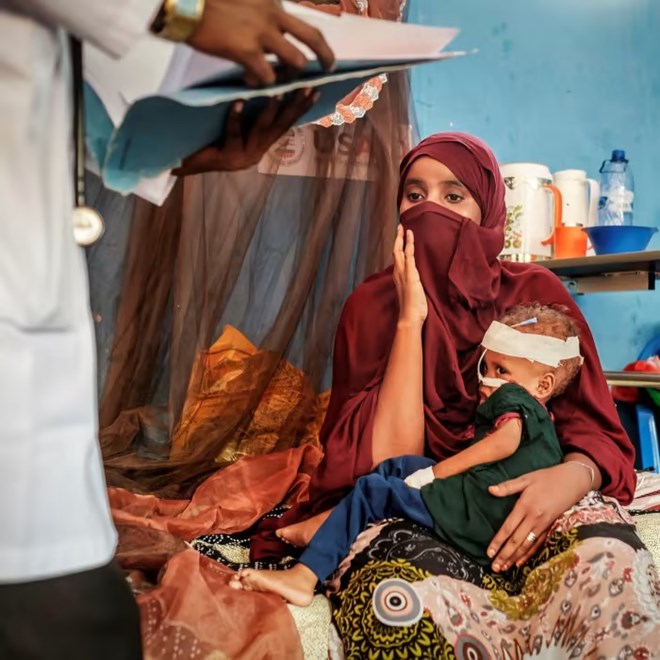
Anzel Arab holds her child Maido, 2 years old, as she talks with doctors in the nutrition ward at the Gode General Hospital, in the city of Gode, Ethiopia, on April 28 2022 © Eduardo Soteras Jalil/FT
Aid agencies are running low on crucial wheat stocks from Ukraine and Russia, two of the world’s top producers. In Ethiopia, the WFP and the government procure around three-quarters of the wheat they distribute from those two countries. Wheat prices from the Black Sea have jumped 67 per cent since last year, mainly due to Russia’s invasion of its neighbour.
“Things will get worse, largely because attention is now focused on bigger emergencies in Ukraine and conflict in the north of Ethiopia . . . resources are also going there and food prices are also rising globally,” added Omar.
Halima Mohamed Abdi, a mother of eight who recently settled in another camp outside Gode, is anxious about what lies ahead. “During previous droughts, if we lost the sheep, goats and cows, the camels would survive,” she said. This time, even camels, which generally endure droughts, are dropping dead.
“We are expecting support from government and aid agencies because, even if it rains, we have nothing left,” she said. “Without help, we would also die of thirst and hunger.”
On World Press Freedom Day, UN emphasizes vital role of Somali media
On World Press Freedom Day, UN emphasizes vital role of Somali media

Source: UN, Tuesday May 3, 2022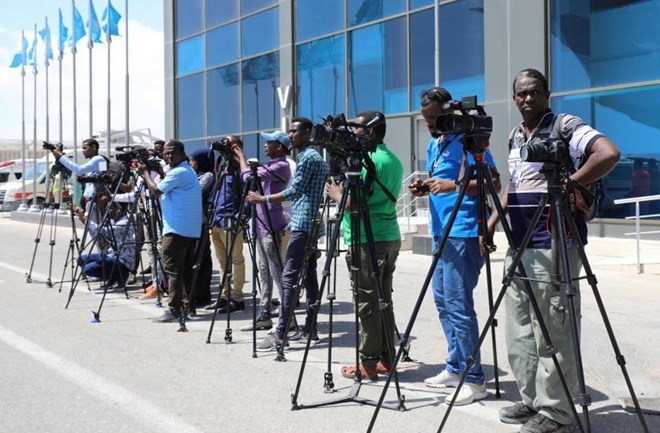
Somali journalists in Mogadishu, Somalia December 29, 2019. © REUTERS/Feisal Omar
Mogadishu – On the occasion of World Press Freedom Day, the United Nations in Somalia emphasizes the vital role that the country’s media play in Somali society and the need to ensure their ability to carry out their work safely and freely.
advertisements“Somalia’s media are a key component for the growth of democracy, and they need to be able to go about their work free from threats, intimidation and harm so they can carry out their important work,” said the UN Secretary-General’s Special Representative for Somalia, James Swan.
Journalists in Somalia remain under physical threat in many areas. Since May last year, one journalist has been killed and two others injured. Moreover, 64 journalists and media workers have been arrested while carrying out their work.
The UN General Assembly proclaimed World Press Freedom Day in 1993, with 3 May designated for the observance to mark the anniversary of the Windhoek Declaration, a landmark statement on the link between the freedom to seek, impart and receive information and the public good. The Day acts as a reminder to governments of the need to respect their commitment to press freedom, as well as celebrate the fundamental principles of press freedom, assess the state of press freedom throughout the world, defend the media from attacks on their independence, and pay tribute to journalists who have lost their lives in the line of duty.
Al-Shabaab attacks African Union base in central Somalia
Al-Shabaab attacks African Union base in central Somalia
FacebookFacebook messengerTwitterWhatsAppLinkedInTelegramEmail

Source: Hiiraan Online, Tuesday May 3, 2022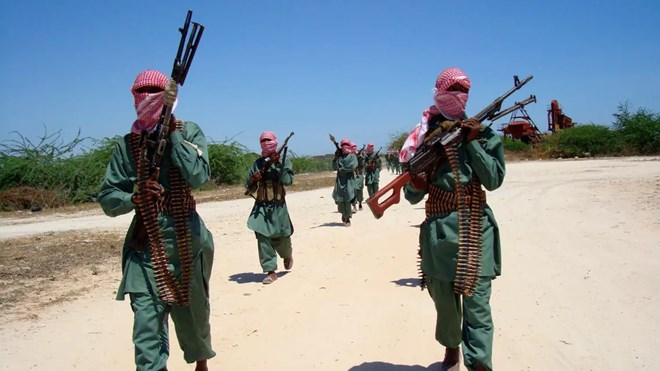
File photo of al-Shabaab militants on the outskirts of Mogadishu. (Reuters)
Mogadishu (HOL) – Al-Shabaab fighters in the Middle Shabelle launched an attack on African Union soldiers on Tuesday morning, according to officials and residents.
advertisements
The attack began with a large explosion, likely from a car bomb, targeting an ATMIS forwarding base in El Baraf, a town 130 km (80 miles) to the north of Mogadishu.
A local elder said that he was awoken by the massive blast, followed by heavy gunfire.
The ATMIS troops stationed in the attacked base are from the Burundi contingent.
There are unconfirmed reports that up to four soldiers from the Somali National Army soldiers were killed in the fighting, and another five were seriously wounded.
Al-Shabaab claimed responsibility for the early morning attack. In a statement sent to their media affiliates, the Al-Qaeda linked group claimed to have killed dozens of African Union troops and surrounded the base.
“The Mujahideen launched a pre-dawn raid on an ATMIS (African Union Mission) military base in El-Baraf, middle Shabelle region,” al Shabaab said. After a fierce firefight, the Mujahideen managed to overrun the base and are now in complete control of the entire military base.”
There has been no official comment yet from the African Union.
Al-Shabab frequently stages attacks against African Union troops in Somalia. A similar incident occurred on Dec 16 when Al-Shabaab attacked the AMISOM base in Bulomarer, Lower Shabelle Region. It is the first attack since the African Union Mission in Somalia (AMISOM) transitioned to African Union Transition Mission in Somalia (ATMIS).
World Food Program’s Effort to Reduce Conflict in Ethiopia’s Somali Region
World Food Program’s Effort to Reduce Conflict in Ethiopia’s Somali Region
Source: The Stockholm International Peace Research Institute published in April 2022 a report titled “The World Food Programme’s Contribution to Improving the Prospects for Peace in Ethiopia” by Farah Hegazi, Vongai Murugani, Grazia Pacillo, and Peter Laderach.
The report assesses the contributions of WFP Ethiopia’s climate adaptation and risk management programs to encourage peace in Ethiopia. It concludes the programs can potentially contribute to conflict reduction in the Somali region of Ethiopia through reducing herders’ mobility during drought and improving natural resource management.
Labels: climate change, conflict, drought, Ethiopia, federalism, food security, livestock, natural resources, pastoralism, peace, Somali Region, WFP
South Sudan’s Shaky Peace Process
South Sudan’s Shaky Peace Process
Source: The Conversation published on 26 April 2022 a commentary titled “Peace in South Sudan Hinges on Forging a Unified Military Force: But It Is Proving Hard” by Madhav Joshi, University of Notre Dame.
Creating a unified armed forces is critical to South Sudan’s peace process. Lack of trust by Salva Kiir and Riek Machar is contributing to difficulties in unifying the armed forces. South Sudan’s peace and stability depend on Kiir and Machar ending the politics of brinkmanship.
Labels: Dinka, Nuer, peace process, Riek Machar, Salva Kiir, security, South Sudan, SPLM-IO
Drought in Horn of Africa Hits Children Hard
Drought in Horn of Africa Hits Children Hard
Source: UNICEF published on 28 April 2022 a press release titled “UNICEF Executive Director Catherine Russell Visits Drought-impacted Somali Region in Ethiopia and Calls for an Immediate Scaled-up Response to Save the Lives of Millions of Children.”
Three failed consecutive rainy seasons in parts of Ethiopia, Djibouti, Kenya, and Somalia have caused one of the worst droughts in decades. One of the most impacted areas is Somali region of Ethiopia. Some 10 million children need urgent life-saving support.
Labels: child marriage, children, disease, Djibouti, drought, Ethiopia, food insecurity, Kenya, malnutrition, Somali Region, Somalia, UNICEF
Eritrea: Russia’s New Best Friend in Africa
Eritrea: Russia’s New Best Friend in Africa
Source: The East African published on 29 April 2022 an article titled “Eritrea Calls for ‘Bilateral Solution’ of Russia-Ukraine Conflict” by Tesfa-Alem Tekle.
A senior Eritrean delegation recently visited Moscow to show support for Russia. The article suggests Eritrea’s support for Russia’s invasion of Ukraine is a way to demonstrate its anti-Americanism and to serve as Russia’s leading representative in Africa. Russia reportedly announced it plans to build a military logistics facility in the port of Assab.
Labels: Eritrea, foreign policy, Isaias Afewerki, military base, PFDJ, Russia, Sergey Lavrov, UAE, Ukraine, US, war
US Horn of Africa Envoy Resigning
US Horn of Africa Envoy Resigning
Source: Foreign Policy published on 12 April 2022 an article titled “U.S. Envoy for East Africa to Call It Quits” by Robbie Gramer and Colum Lynch.
David Satterfield, appointed in January 2022 as the US special envoy for the Horn of Africa, is expected to resign and be replaced on an interim basis by his deputy, Payton Knopf. There was no explanation for his brief tenure in the position.
Labels: David Satterfield, diplomacy, Ethiopia, Horn of Africa, humanitarian crisis, Payton Knopf, Sudan, US
US Navy to Establish New Red Sea Task Force
US Navy to Establish New Red Sea Task Force
Source: Defense News published on 13 April 2022 an article titled “Combined Maritime Forces Establishes New Naval Group to Patrol Red Sea Region” by Megan Eckstein.
The multinational Combined Maritime Forces in the Middle East will stand up a new Combined Task Force-153 to address maritime threats in the Red Sea and the Gulf of Aden. The U.S. Navy will lead the task force initially, but will hand leadership over to a regional partner. At any given time, the task force will consist of two to eight ships, which is not an increase in the present number of ships in the region but an effort to improve coordination and effectiveness. They will operate from the Suez Canal through the Bab el-Mandeb strait to the Yemen-Oman border and will address human trafficking and smuggling of both legal materials like coal and illegal weapons and drugs.
Labels: Bab el-Mandeb, coal, drugs, Egypt, Gulf of Aden, human trafficking, Red Sea, Saudi Arabia, security, smuggling, Somalia, Suez Canal, US Navy, weapons, Yemen
Building on Ethiopia’s Fragile Truce
Building on Ethiopia’s Fragile Truce
Source: The International Crisis Group published a statement on 15 April 2022 titled “Building on Ethiopia’s Fragile Truce.”
The statement lays out a series of steps for helping to ensure that Ethiopia’s cease fire holds. One of the most contentious issues is continued Tigrayan occupation of adjacent land inside Amhara and Afar regions and Amhara occupation of contested western Tigray.
Labels: Abiy Ahmed, Afar Region, Amhara Region, AU, cease fire, civil war, Eritrea, Ethiopia, ethnic cleansing, humanitarian access, OLA, Oromia, Sudan, Tigray Region, TPLF, US, WFP
Ethiopia: Aid Convoys Are Reaching Tigray Region
Ethiopia: Aid Convoys Are Reaching Tigray Region
Source: Agence France Presse published on 14 April 2022 an article titled “New Aid Convoys for Ethiopia’s Tigray after Truce” by Aymeric Vincenot.
A truce in Ethiopia has allowed relief convoys to reach blockaded Tigray region as of the beginning of April.
Labels: Abiy Ahmed, Afar Region, Amhara Region, cease fire, famine, humanitarian aid, Tigray Region, TPLF, WFP
